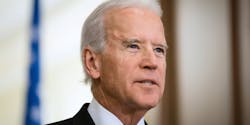Joseph Biden Declared President-Elect Following Prolonged Vote-Counting
Following a prolonged period of critical battleground states taking several days to count mail-in ballots, Joseph Biden was declared the winner of the 2020 presidential election by news media November 7 after his margin in home state Pennsylvania pushed him over the 270 electoral votes needed to secure the win in the electoral college.
His opponent, President Trump, has yet to concede. He has issued a number of legal challenges to the vote in several states, alleged fraud, and claimed that the declaration was premature.
Biden’s proposed manufacturing policies differ substantially from Trump’s.
In a speech delivered September 9 in Michigan, Biden said he would include a tax penalty against companies that offshore operations and an advanceable tax credit for companies to create manufacturing jobs or modernize manufacturing facilities. He’s also signaled support for increased regulation, breaking from President Trump’s more laissez-faire approach to tax.
Biden’s ability to pass any significant tax legislation may be hampered by the Senate. Democrats hoping for a landslide victory that would turn over the presidency and control of Congress were disappointed by lukewarm results that thus far have managed to flip one seat to the Democrats. If Republicans retain control of the Senate, it’s unlikely a President Biden would be able to make promised changes to the tax code without concessions to the GOP.
President Trump defined his approach to international trade disputes early on by issuing a salvo of tariffs on Chinese goods. The resultant “trade war” brought China to the table for a trade deal that saw them agree to substantial purchases of U.S. manufactured and agricultural goods, stricter intellectual property standards, and a dispute settlement mechanism. His administration also passed an updated version of NAFTA: the United States-Canada-Mexico Agreement, or USMCA.
By contrast, Biden, a former architect of the TPP, is likely to attempt to establish wider partnerships and foster good relations with organizations like the WTO and World Bank, groups Trump and others have criticized as partisan and biased against American interests.
On the issue of the skilled manufacturing employees, Biden has advocated for increased investment in trade schools and said he would work with unions on registered apprenticeships. President Trump has also advocated for increased apprenticeships: His “Pledge to America’s Workers” has promoted more than 16 million company-sponsored apprenticeship programs to date.
The candidates stood much at odds on the issue of the COVID-19 pandemic. President Trump has repeatedly signaled optimism that the pandemic is near its end and said Joe Biden intends to reinstate lockdowns that shuttered businesses for weeks earlier in the summer. Biden has criticized President Trump’s response as inadequate and has said he intends to prioritize pandemic recovery from “day one” of his presidency.
About the Author
IW Staff
Find contact information for the IndustryWeek staff: Contact IndustryWeek
